Little Vineyards - Big Wines
Wholesale wines from France
Direct importerLittle Vineyards - Big Wines
Little Vineyards - Big Wines
Little Vineyards - Big Wines
We are a family company that imports wines from France. Each wine selection we buy is preceded by our personal visit directly to the producer, during which we conduct a tasting and meet people who passionately continue several generations of wine traditions.
We are introduced to the entire production process from grape harvest to bottling.
The wines we offer are not widely distributed because they come from small vineyards, and therefore are produced in artisanal, not industrial, quantities.
We take care of the appropriate quality of the proposed wines and a guarantee of constant deliveries.
Wholesale wine sales - Legnica, Wrocław, Lower Silesia and the whole of Poland!
We are a family company that imports wines from France. Each wine selection we buy is preceded by our personal visit directly to the producer, during which we conduct a tasting and meet people who passionately continue several generations of wine traditions.
We are introduced to the entire production process from grape harvest to bottling.
The wines we offer are not widely distributed because they come from small vineyards, and therefore are produced in artisanal, not industrial, quantities.
We take care of the appropriate quality of the proposed wines and a guarantee of constant deliveries.
Wholesale wine sales - Legnica, Wrocław, Lower Silesia and the whole of Poland!

The refined taste of grapes and the richness of aromas.
"Wine is not only drunk. Wine is smelt, watched, admired, tasted, sipped and we talk about wine."

The refined taste of grapes and the richness of aromas.
"Wine is not only drunk. Wine is smelt, watched, admired, tasted, sipped and we talk about wine."The Alsace region is located on the border with Germany. It stretches from south to north along the Rhine Valley and the Vosges Range. The wine growing region is the Rhine Valley. The long growing season, the lack of major daily temperature fluctuations, low rainfall, different types of soil and high sun exposure to the slopes make the wines from this region characterized by a wide range of flavors and aromaticity. The fermentation process often takes place in large oak barrels, sometimes over 100 years old. Over 90% of Alsatian wines are white.
Appeal is a term used in winemaking. It defines a limited area dedicated to the cultivation of vines for a particular type of wine. Additionally, the name of the vineyard and grape variety must appear on the label. Alsatian wine appellations are: Alsace, Alsace Grand Cru, Vendanges Tardives (VT) and Sélection de Grains Nobles (SGN).
Bottling takes place in the first spring after harvest, while the wine is still fresh and young. From 1972, Alsatian wines must be bottled in the place where they come from. The Alsatian wine bottle has a characteristic shape. She is tall with a slender neck. It is mandatory to indicate the appellation, producer and strain name on the label.
The four basic varieties for the production of the highest quality wines with the Alsace Grand Cru appeal are: riesling, pinot gris, gewürztraminer and muscat. The other strains are called pinot blanc, sylvanera, auxerrois blanc, chasselas and pinot noir cultivated in small amounts.
The Alsace region is located on the border with Germany. It stretches from south to north along the Rhine Valley and the Vosges Range. The wine growing region is the Rhine Valley. The long growing season, the lack of major daily temperature fluctuations, low rainfall, different types of soil and high sun exposure to the slopes make the wines from this region characterized by a wide range of flavors and aromaticity. The fermentation process often takes place in large oak barrels, sometimes over 100 years old. Over 90% of Alsatian wines are white.
Appeal is a term used in winemaking. It defines a limited area dedicated to the cultivation of vines for a particular type of wine. Additionally, the name of the vineyard and grape variety must appear on the label. Alsatian wine appellations are: Alsace, Alsace Grand Cru, Vendanges Tardives (VT) and Sélection de Grains Nobles (SGN).
Bottling takes place in the first spring after harvest, while the wine is still fresh and young. From 1972, Alsatian wines must be bottled in the place where they come from. The Alsatian wine bottle has a characteristic shape. She is tall with a slender neck. It is mandatory to indicate the appellation, producer and strain name on the label.
The four basic varieties for the production of the highest quality wines with the Alsace Grand Cru appeal are: riesling, pinot gris, gewürztraminer and muscat. The other strains are called pinot blanc, sylvanera, auxerrois blanc, chasselas and pinot noir cultivated in small amounts.
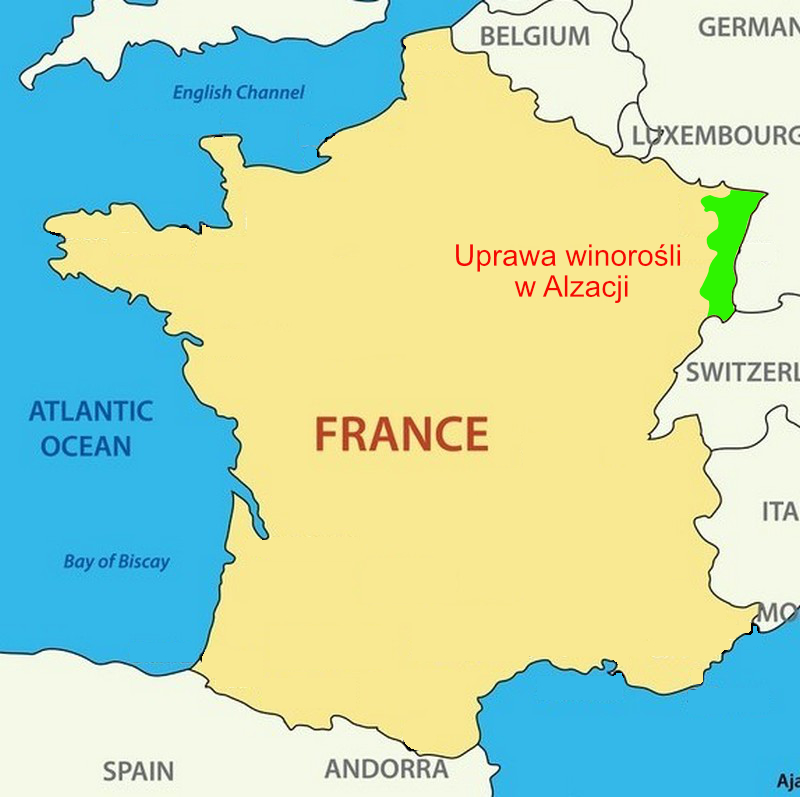


The company "WINKO" Piotr Iwaszko offers renowned brands of wines from the Loire Valley


The company "WINKO" Piotr Iwaszko offers renowned brands of wines from the Loire Valley
Muscadet| Pouilly Fumé | Sancerre | Anjou | Montlouis | Saumur| Nantes | Touraine | Quincy
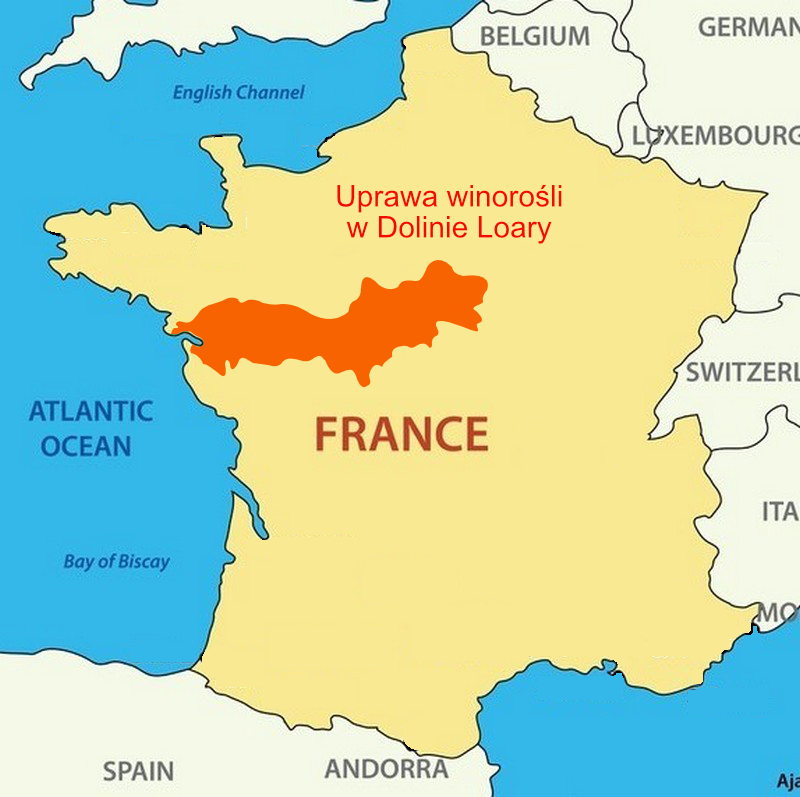
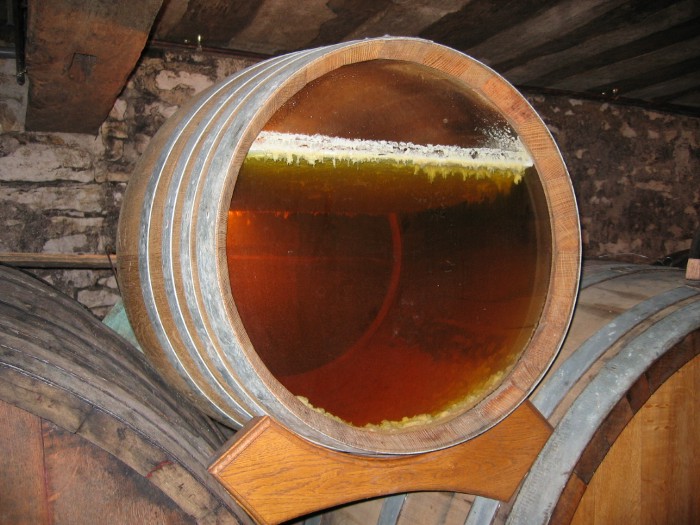
Sur Lie - barrel with sediment
The Loire Valley Wine Route


Sur Lie - barrel with sediment
The Loire is the longest, over 1000 km long river in France. Vineyards are spread over the slopes gently sloping towards the river and its tributaries. It is an area of approx. 64 thousand. hectares. Morning vapors from the Loire and its tributaries create a unique microclimate. It shapes the nature of the crops by creating a unique taste and aroma of the produced wines. The proximity to the Atlantic Ocean also has a huge impact on the estuary wine growing. The soils in the Loire Valley are calcareous, which is favorable for cultivation.
The four main wine growing regions in the Loire Valley are: Anjou, Nantes, Touraine and Center. The specialty of these crops is the production of white wines - it is 2 million hectoliters per year. 81% of them have the AOC Certificate of Origin - Controlled Designation of Origin (Appellatiion d'Origine Contrôlée). As many as 52 areas are allowed to mark wines with the AOC certificate. The oldest appeals are from 1936: Muscadet, Sancerre, Quincy, and Vouvray.
The size of the entire growing region, combined with the abundance of microclimates and the diversity of local traditions, make the wines produced here in many styles with a very interesting and diverse character. The most famous white wines are: Muscadet, Pouilly Fumé and Sancerre.
These wines are made from the Chenin and Sauvignon varieties. They have a delicate linden aroma and good acidity. The best vintages mature for 10 years.
Muscadet is manufactured in and around Nantes. It is characterized by a relatively low alcohol content and excellent acidity. The Sancerre and Pouilly Fumé wines are made from the Sauvignon grape.
Muscadet wine bottles have a characteristic shape and the glass is engraved with the words Sur Lie at the top of the bottle and Muscadet at the bottom.
Muscadet wine is produced by a method known as Sur Lie, which means in English sediment. It is connected with leaving natural yeast sediment from fermentation in the barrel. The wine stays in it through the winter and is bottled in spring or autumn the following year. This gives the wine a specific taste and enriches the aroma bouquet.
The Loire is the longest, over 1000 km long river in France. Vineyards are spread over the slopes gently sloping towards the river and its tributaries. It is an area of approx. 64 thousand. hectares. Morning vapors from the Loire and its tributaries create a unique microclimate. It shapes the nature of the crops by creating a unique taste and aroma of the produced wines. The proximity to the Atlantic Ocean also has a huge impact on the estuary wine growing. The soils in the Loire Valley are calcareous, which is favorable for cultivation.
The four main wine growing regions in the Loire Valley are: Anjou, Nantes, Touraine and Center. The specialty of these crops is the production of white wines - it is 2 million hectoliters per year. 81% of them have the AOC Certificate of Origin - Controlled Designation of Origin (Appellatiion d'Origine Contrôlée). As many as 52 areas are allowed to mark wines with the AOC certificate. The oldest appeals are from 1936: Muscadet, Sancerre, Quincy, and Vouvray.
The size of the entire growing region, combined with the abundance of microclimates and the diversity of local traditions, make the wines produced here in many styles with a very interesting and diverse character. The most famous white wines are: Muscadet, Pouilly Fumé and Sancerre.
These wines are made from the Chenin and Sauvignon varieties. They have a delicate linden aroma and good acidity. The best vintages mature for 10 years.
Muscadet is manufactured in and around Nantes. It is characterized by a relatively low alcohol content and excellent acidity. The Sancerre and Pouilly Fumé wines are made from the Sauvignon grape.
Muscadet wine bottles have a characteristic shape and the glass is engraved with the words Sur Lie at the top of the bottle and Muscadet at the bottom.
Muscadet wine is produced by a method known as Sur Lie, which means in English sediment. It is connected with leaving natural yeast sediment from fermentation in the barrel. The wine stays in it through the winter and is bottled in spring or autumn the following year. This gives the wine a specific taste and enriches the aroma bouquet.

Import, sale and distribution of wine for gastronomy, restaurants, hotels and catering.
"Wine is more than a drink - it is a lifestyle!"

Import, sale and distribution of wine for gastronomy, restaurants, hotels and catering.
"Wine is more than a drink - it is a lifestyle!"Burgundy is a wine region from Lyon to Auxerre and Chablis. It is climatically varied with numerous independent wine zones. Located in the north, Chablis is the coolest. It is 250 km to Macon in the south. The soils intended for vineyards are mixed. The most outstanding habitats have south or east exposure. They are thus naturally protected against western winds.
Two varieties dominate the growing region: chardonnay and pinot noir. The first is half the acreage, the second is one third. The aligoté and gamay grape varieties are also grown in Burgundy. Burgundy Chardonnay wines are very varied.
Burgundy winemakers make a significant contribution to the development of winemaking. They were among the first to refine wine using techniques such as low lactic fermentation for white wines or barrel fermentation.
Each Grand cru in Burgundy is also an appeal. More than 30 vineyards are entitled to the honorable title of Grand Cru. These places are characterized by unique soil and microclimatic conditions. As a result, wines from such vineyards are of exceptionally high quality, aroma and taste.
This designation applies to plots, of which there are currently around 600 plots. It can also be translated as a specific microclimate that determines the high quality of wines produced there. Premier cru is not always an appeal.

Import, sale and distribution of wine for gastronomy, restaurants, hotels and catering.
"Wine is more than a drink - it is a lifestyle!"
Burgundy is a wine region from Lyon to Auxerre and Chablis. It is climatically varied with numerous independent wine zones. Located in the north, Chablis is the coolest. It is 250 km to Macon in the south. The soils intended for vineyards are mixed. The most outstanding habitats have south or east exposure. They are thus naturally protected against western winds.
Two varieties dominate the growing region: chardonnay and pinot noir. The first is half the acreage, the second is one third. The aligoté and gamay grape varieties are also grown in Burgundy. Burgundy Chardonnay wines are very varied.
Burgundy winemakers make a significant contribution to the development of winemaking. They were among the first to refine wine using techniques such as low lactic fermentation for white wines or barrel fermentation.
Each Grand cru in Burgundy is also an appeal. More than 30 vineyards are entitled to the honorable title of Grand Cru. These places are characterized by unique soil and microclimatic conditions. As a result, wines from such vineyards are of exceptionally high quality, aroma and taste.
This designation applies to plots, of which there are currently around 600 plots. It can also be translated as a specific microclimate that determines the high quality of wines produced there. Premier cru is not always an appeal.
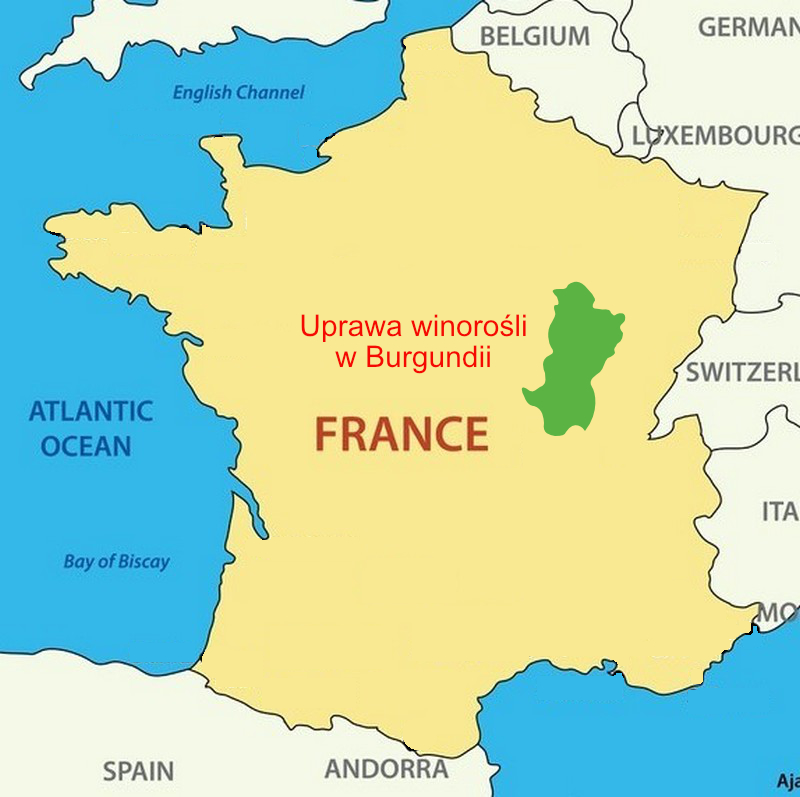


Wide range of Gascon wines for connoisseurs
Wine for restaurants, wine for hotels and more

Wide range of Gascon wines for connoisseurs
Wine for restaurants, wine for hotels and more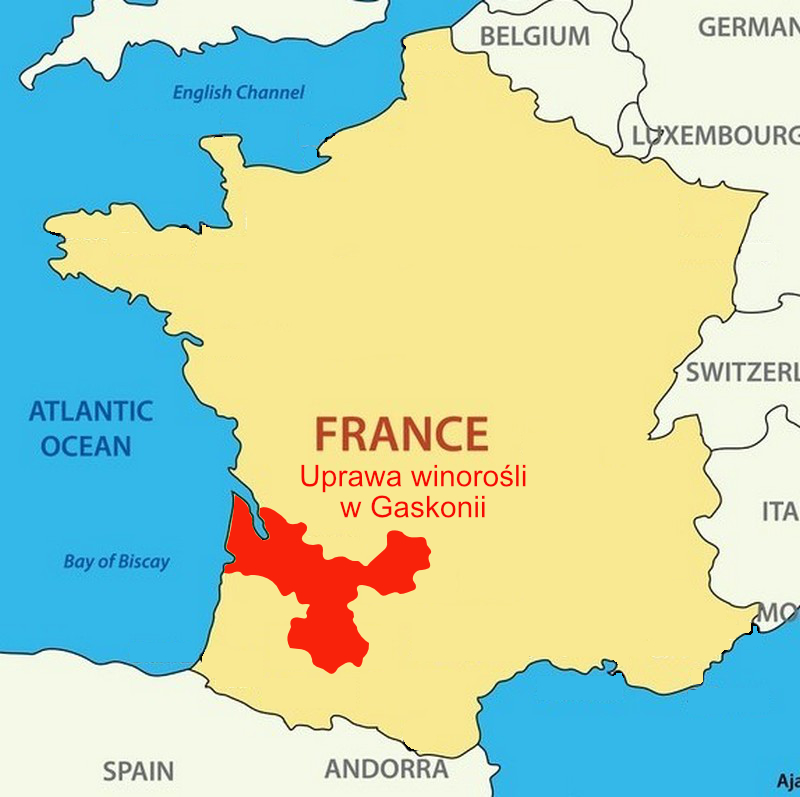

Gascony is located in the southwestern of France between Toulouse and the Atlantic Ocean. It borders with Spain based on the Pyrenees. The climate in this region is favorable for the cultivation of vines. The Atlantic Ocean lowers the temperature, while the proximity to the mountains increases its diurnal fluctuations, which is ideal for grapevines. The growing season for plants is long here. All these factors together lead to an increased and more concentrated bouquet of grape aromas and keep them fresh longer. Characteristic for wines from Gascony is also their high acidity.
Wines from this region are labeled with IGP Côtes de Gascogne. IGP is the European specification of the wine quality category - Indication Geographique Protegee (Protected Geographical Indication). In France, it is referred to as Vin de Pays (VDP) - national wine. The annual production of white wine in Gascony is 800,000 hectoliters. The grapevine is cultivated by about 1,400 growers, most of whom are associated in production cooperatives.
The production of white wine in Gascony is one of the most popular. The leading grape varieties are: sauvignon blanc, colombard, ugni blanc, chardonnay, merlot, cabernet sauvignon, cabernet franc and tannat.
Gascony is located in the southwestern of France between Toulouse and the Atlantic Ocean. It borders with Spain based on the Pyrenees. The climate in this region is favorable for the cultivation of vines. The Atlantic Ocean lowers the temperature, while the proximity to the mountains increases its diurnal fluctuations, which is ideal for grapevines. The growing season for plants is long here. All these factors together lead to an increased and more concentrated bouquet of grape aromas and keep them fresh longer. Characteristic for wines from Gascony is also their high acidity.
Wines from this region are labeled with IGP Côtes de Gascogne. IGP is the European specification of the wine quality category - Indication Geographique Protegee (Protected Geographical Indication). In France, it is referred to as Vin de Pays (VDP) - national wine. The annual production of white wine in Gascony is 800,000 hectoliters. The grapevine is cultivated by about 1,400 growers, most of whom are associated in production cooperatives.
The production of white wine in Gascony is one of the most popular. The leading grape varieties are: sauvignon blanc, colombard, ugni blanc, chardonnay, merlot, cabernet sauvignon, cabernet franc and tannat.
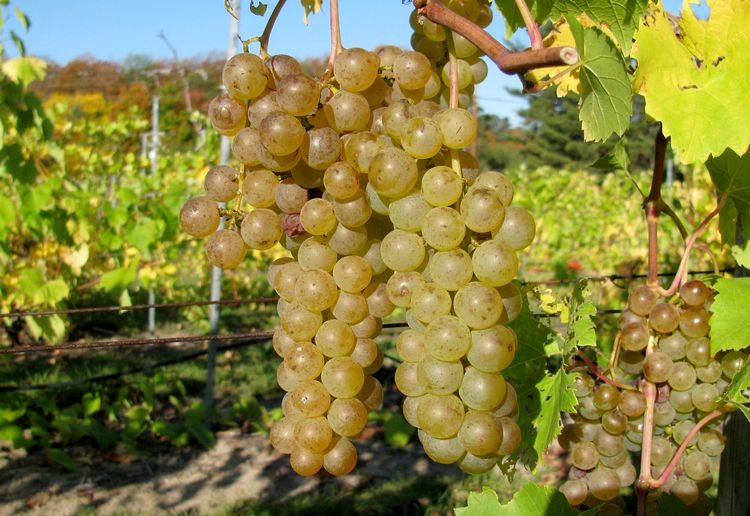


Contact
"WINKO" Piotr Iwaszko
ul. Tadeusza Kościuszki 52E/4
59-220 Legnica, Poland
We invite you: Mon - Fri: 10.00 - 18.00
Contact
"WINKO" Piotr Iwaszko
ul. Tadeusza Kościuszki 52E/4
59-220 Legnica, Poland
We invite you: Mon - Fri: 10.00 - 18.00
All rights reserved © "WINKO" Piotr Iwaszko
Tax ID: 6912418413 | Bank account number: 44 2490 0005 0000 4500 8628 6227
All rights reserved © "WINKO" Piotr Iwaszko
Tax ID: 6912418413 | Bank account number: 44 2490 0005 0000 4500 8628 6227